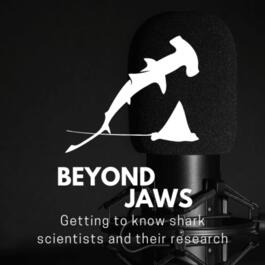
Exploring the Diversity of Fields within Shark Science
On this episode of the Beyond Jaws podcast, Dr. Charlie Huveneers joins as a guest to discuss his career studying the Wabbegon sharks. The hosts express their excitement about this unique shark and the interesting conversation that follows. They delve into the growth of shark science, from the limited knowledge in the early 1900s to the diverse fields within the discipline today. The hosts also highlight the public's increased fascination with sharks, spurred on by movies like Jaws. With a focus on exploration, discovery, genetics, and ecology, the Beyond Jaws podcast aims to introduce listeners to shark scientists and their work, taking knowledge beyond fear and stereotypes. The hosts are thrilled to have Charlie on the show, as they have followed his career from its early stages and are eager to hear about his experiences and research. Connect with us: Website: https://bit.ly/37TMqeK Instagram: https://bit.ly/3eorwXZ Beyond Jaws is supported by Save Our Seas Website: https://saveourseas.com/ Dave: Website: https://www.lostsharkguy.com/ Instagram: https://bit.ly/3q1J9Q5 Andrew: Website: https://www.speakupforblue.com/ Instagram: https://bit.ly/37g5WkG In this episode, the guest speaker explores the potential benefits of researchers participating in TV shows. While acknowledging that simply appearing on TV may not directly advance one's career, the speaker suggests that researchers can leverage this opportunity to their advantage. One way to do so is by utilizing the platform to secure funding for their research. Initially hesitant, the guest speaker admits to feeling like they were compromising their integrity. However, they soon realized that by establishing relationships with reputable production companies and conducting meaningful research, they could derive value from these experiences. The guest speaker shares that their involvement in various production and documentary trips provided them with research opportunities that would have been otherwise inaccessible through traditional funding channels. By participating in these shows, they gained access to resources and opportunities that would have otherwise been unavailable. It is crucial to establish clear expectations with the production company from the outset, ensuring that the research trip aligns with their work and is not merely a series of random experiments for the show. The guest speaker emphasizes that they would not allow a crew to accompany them on their research trips, as it would disrupt their work. Instead, production companies approach them due to their interest in the research, seeking to film it. The episode also sheds light on the financial aspect of participating in TV shows. The guest speaker advises young researchers to consider what they hope to gain beyond mere television exposure. They encourage researchers to be transparent about their funding needs, whether it be for their research, educational expenses, or acquiring necessary equipment. The guest speaker highlights that networks generate millions, if not tens of millions, of dollars from these shows, emphasizing that researchers should not undervalue themselves. They suggest that any form of support, whether financial or mentorship, can significantly benefit researchers in their scientific careers. Overall, the episode suggests that participating in TV shows can be advantageous for researchers if they can leverage it to secure funding for their research. It provides an opportunity to establish relationships with production companies, access resources for research, and potentially receive financial support. In addition, the guest speaker emphasizes the importance of perseverance, resilience, and embracing rejection in the field of research. They explain that achieving one's goals in a research career often requires persistence and a thick skin. They also acknowledge that even experienced researchers face rejection in funding applications and paper submissions. However, they stress that rejection or lack of response does not imply inadequacy or undeserving. The guest speaker also acknowledges the role of luck in research opportunities but emphasizes that it is not the sole determining factor. They highlight the significance of possessing the right qualifications, background, and motivation. Personal anecdotes are shared to illustrate the importance of motivation and perseverance in research. The guest speaker also acknowledges that unfortunate timing and luck can sometimes result in missed opportunities, but it is crucial to remain determined and continue working towards one's goals. The episode emphasizes that researchers should not hesitate to request funding or resources. The speaker underscores that networks generate significant profits, even in the tens of millions of dollars, from TV shows. Therefore, researchers should confidently seek the financial support they require for their research or other expenses, such as college tuition. The episode underscores the importance of considering the financial aspect of a scientific career, particularly for young researchers starting out. Furthermore, the episode highlights the value of mentorship for researchers. While not extensively discussed, mentorship is mentioned as a crucial factor to consider alongside funding and resources. Mentorship can provide guidance, support, and opportunities for researchers to develop their careers and establish valuable connections in their field. In summary, the episode suggests that researchers should not hesitate to seek funding and resources, as networks profit significantly from TV shows. Additionally, mentorship is highlighted as a valuable aspect of a scientific career.
From "Beyond Jaws: Exploring Shark Science and Conservation"


Comments
Add comment Feedback